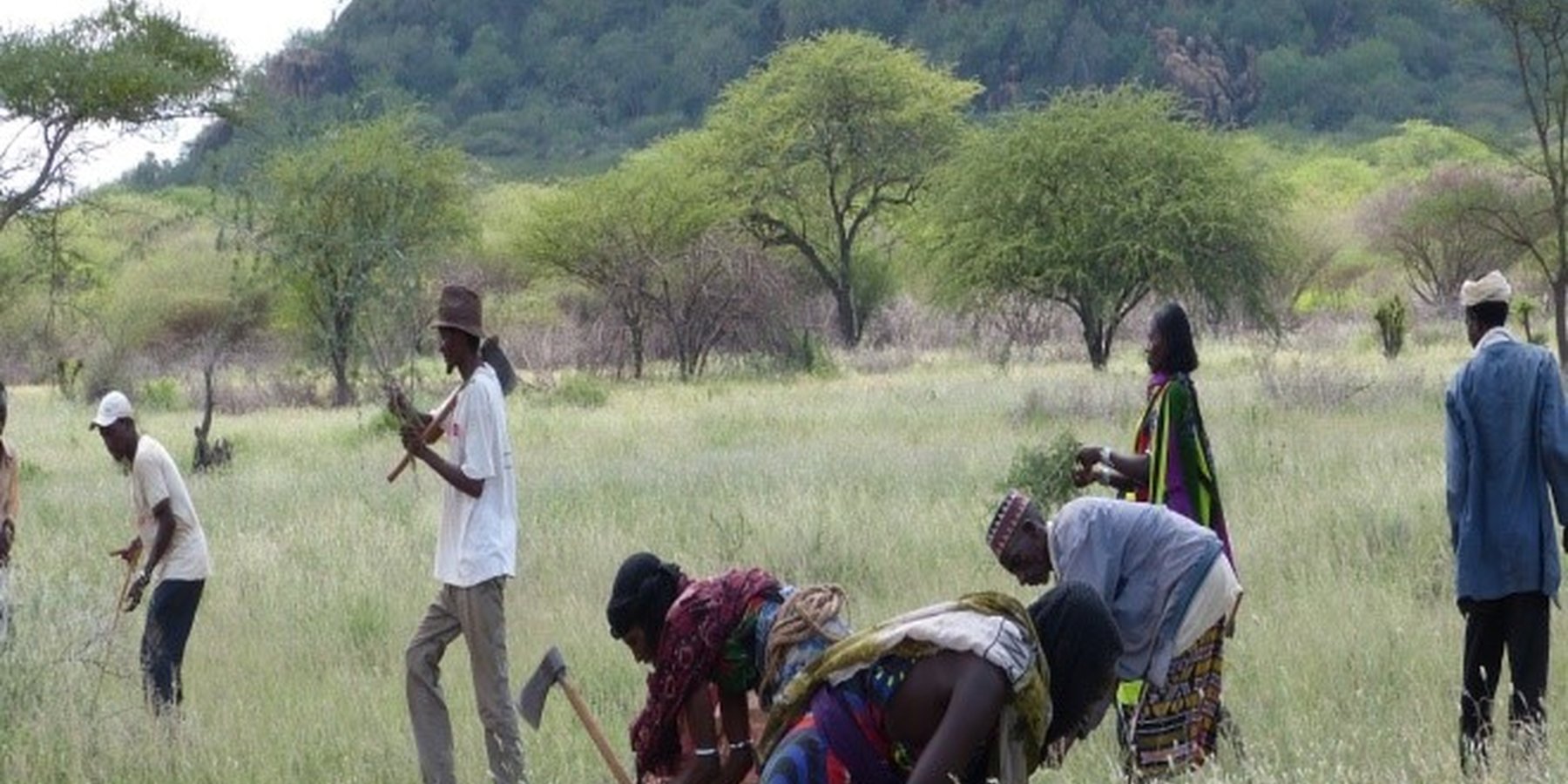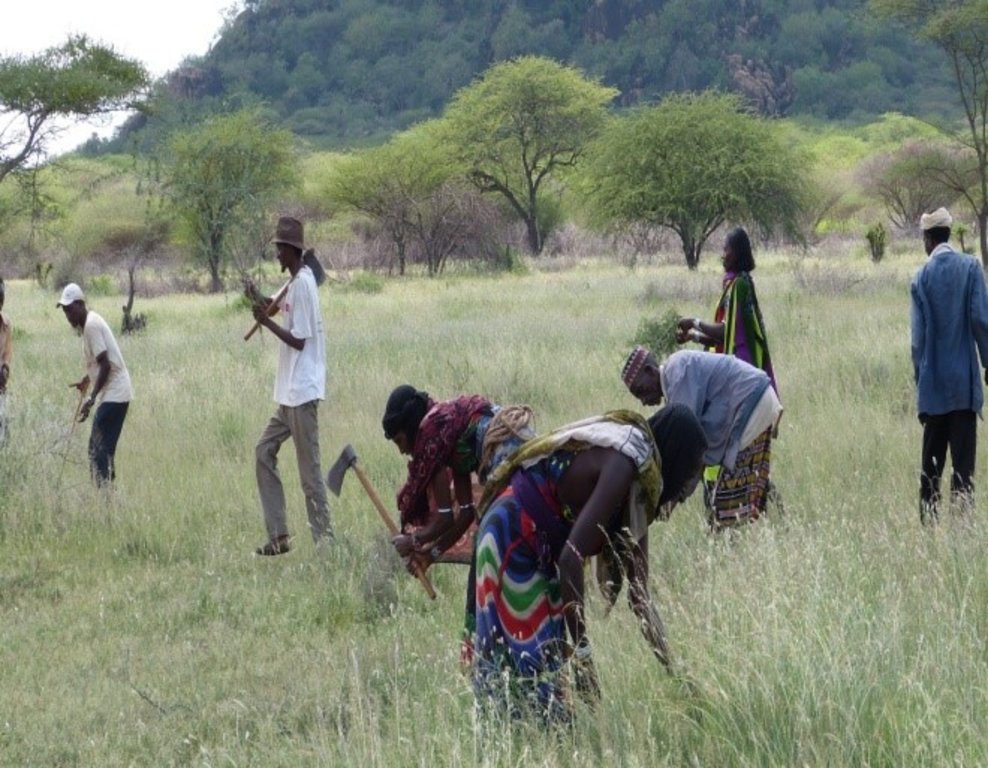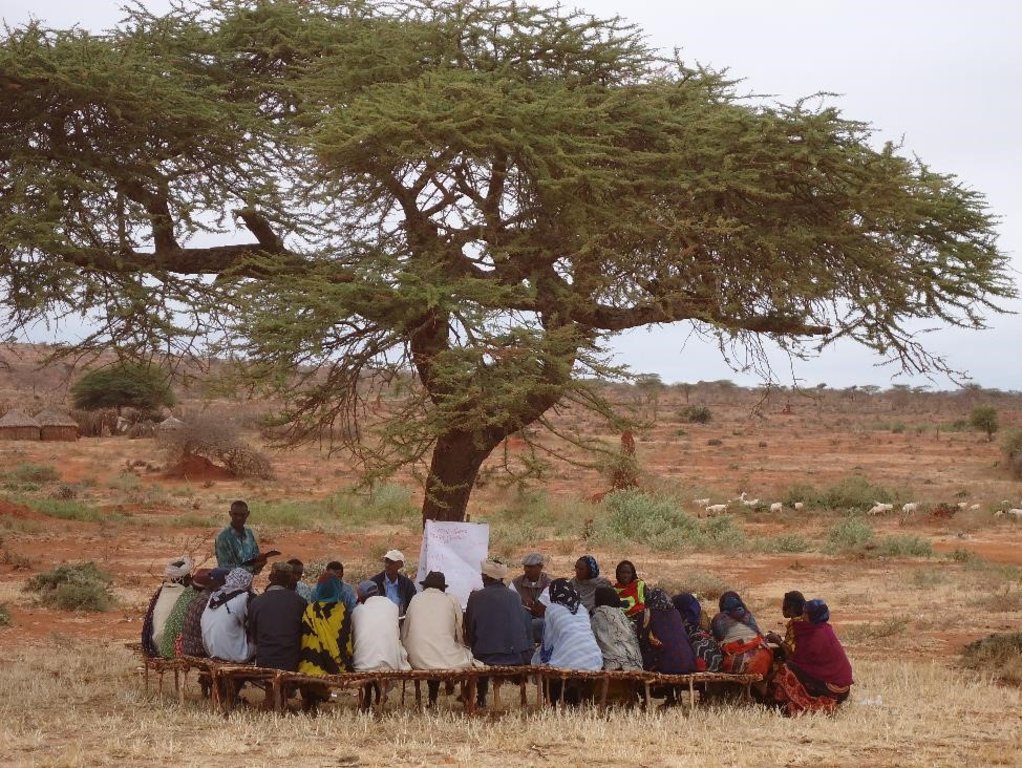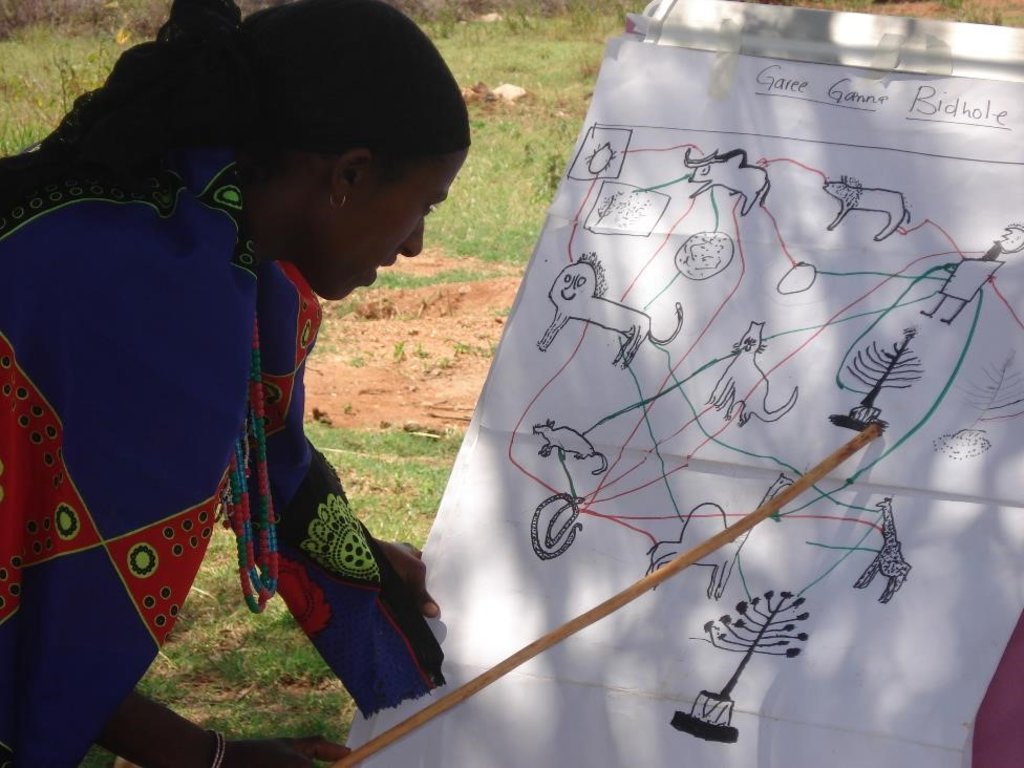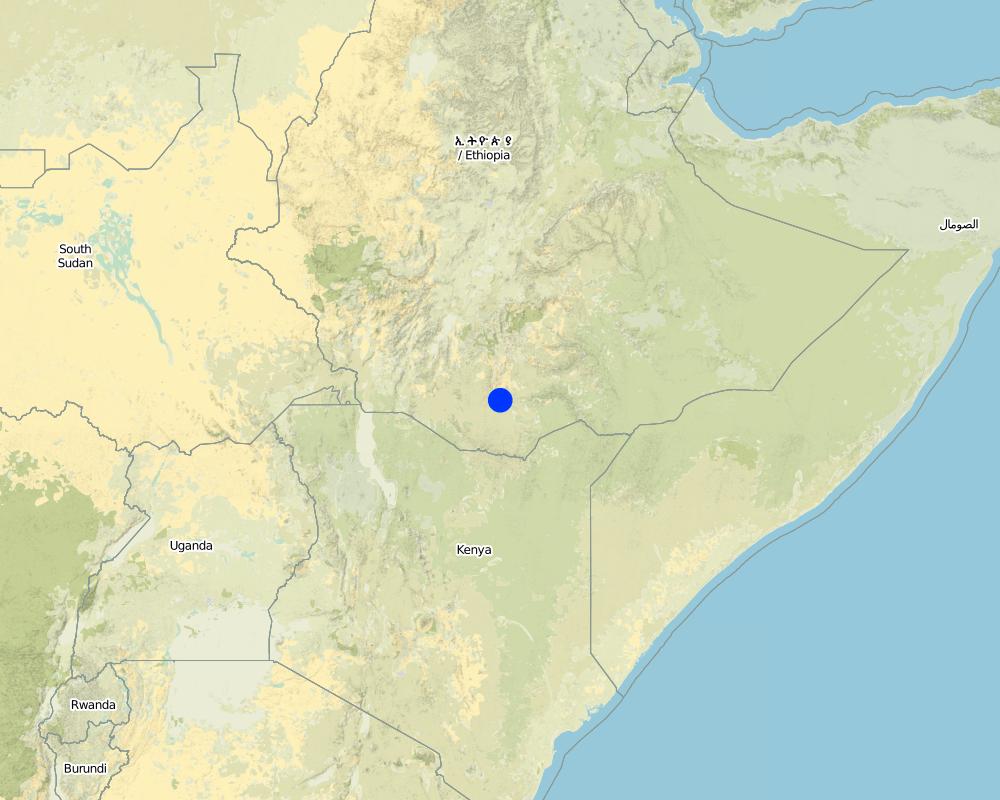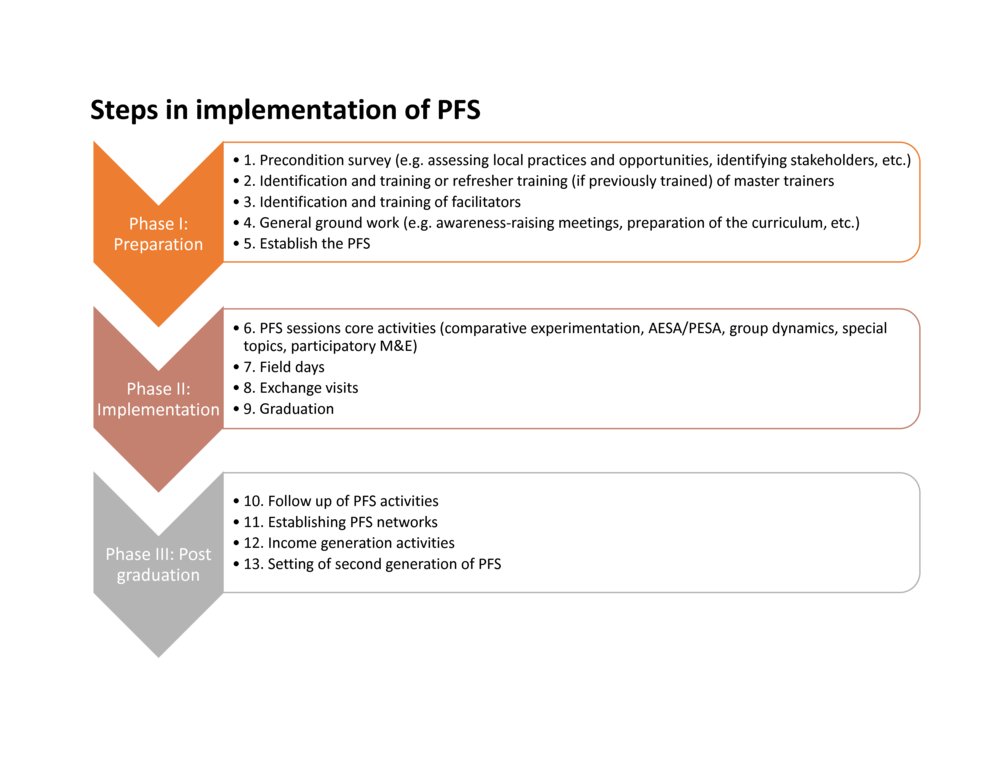Pastoralist field schools [Etiópia]
- Criação:
- Atualização:
- Compilador/a: Giacomo de' Besi
- Editor: –
- Revisor: Rima Mekdaschi Studer
approaches_3337 - Etiópia
- Resumo completo em PDF
- Resumo completo em PDF para impressão
- Resumo completo no navegador
- Resumo completo (sem formatação)
- Pastoralist field schools: 9 de Outubro de 2018 (inactive)
- Pastoralist field schools: 24 de Abril de 2018 (inactive)
- Pastoralist field schools: 2 de Novembro de 2021 (inactive)
- Pastoralist field schools: 4 de Julho de 2018 (inactive)
- Pastoralist field schools: 15 de Março de 2018 (inactive)
- Pastoralist field schools: 21 de Agosto de 2024 (public)
Veja as seções
Expandir tudo Recolher tudo1. Informação geral
1.2 Detalhes do contato das pessoas capacitadas e instituições envolvidas na avaliação e documentação da abordagem
Pessoa(s) capacitada(s)
Especialista em GST:
Duveskog Deborah
Deborah.Duveskog@fao.org
Food and Agriculture Organization of the United Nations (FAO)
United Nations Complex in Nairobi, UN Avenue, Gigiri, Block P Box 30470 Nairobi, Kenya
Quênia
Especialista em GST:
Nega Solomon
Solomon.Nega@fao.org
Food and Agriculture Organization of the United Nations (FAO)
CMC road Near ILRI, Kebele 12/13 Bole Sub City, Gurd Shola P.O. Box 5536 Addis Ababa, Ethiopia
Etiópia
Nome do projeto que facilitou a documentação/avaliação da Abordagem (se relevante)
Improved food security, livelihoods and resilience of vulnerable pastoral communities in the Greater Horn of Africa through the pastoralist field school approachNome da(s) instituição(ões) que facilitou(ram) a documentação/avaliação da Abordagem (se relevante)
FAO Kenya (FAO Kenya) - Quênia1.3 Condições em relação ao uso da informação documentada através de WOCAT
Quando os dados foram compilados (no campo)?
01/04/2014
O/a compilador/a e a(s) pessoa(s) capacitada(s) aceitam as condições relativas ao uso de dados documentados através da WOCAT:
Sim
2. Descrição da abordagem de GST
2.1 Descrição curta da abordagem
Pastoralist field schools improve livelihoods and resilience of pastoral communities through a process of hands-on experimental and participatory learning. They are "schools without walls" that introduce good agricultural and marketing practices while building on local knowledge. The PFS approach builds heavily on the basic principles of discovery based learning to address a wide range of issues affecting pastoral livelihoods.
2.2 Descrição detalhada da abordagem
Descrição detalhada da abordagem:
The Pastoral Field School (PFS) approach was the key development tool used in the FAO project entitled “Improved food security, livelihoods and resilience of vulnerable pastoral communities in the Greater Horn of Africa through the pastoralist field school approach”. The project was implemented between June 2011 and July 2015 and targeted agropastoralists in the West Pokot and Turkana areas of Kenya, the Karamoja area of Uganda and Borena and Guji Zones of Ethiopia. Indirect beneficiaries included Non-governmental organizations (NGO) and development actors involved in PFS actions across the region, largely through capacity building. The project was implemented through FAO regional and country offices in close collaboration with selected implementation partners in the countries, including communities, both local and international NGOs and governments.
The PFS approach is an adaptation of the Farmer Field School (FFS) approach. The FFS approach emerged in South East Asia in 1989 as a way to better engage farmers in a field-based enquiry for participatory identification and adoption/adaptation of solutions to local problems. The approach builds on the principles of adult and non-formal education, and experimental and emancipatory learning with a focus on learning processes and building analytical capacity as opposed to traditional extension approaches that focus on top down dissemination of information to farmers. The PFS approach was first tested in 2006 in Kenya by FAO, VSF-Belgium and the International Livestock Research Institute (ILRI).
A PFS can be described as "school without walls" that introduces new pastoral techniques and practices (including SLM technologies) while building on indigenous knowledge, with community empowerment as a result. Through experiential and participatory learning techniques applied in a group setting (25-30 members), with regular meetings over a season/production cycle, , (agro-)pastoralists learn how to analyze their situation and make informed decisions about their livelihood practices and resource use strategies. When empowered to make informed decisions and adapt to changes in the environment, community members are better able to support disaster risk reduction and mitigation of climate change impacts. A facilitator (trained by an experienced field school master trainer) guides the learning process and ensures that the group activities are interlinked with a community managed disaster risk reduction plan. The technical topics covered can include animal production and health, pasture and range management, dryland farming, livestock fodder production, community-managed disaster risk reduction and alternative incomes. The informal nature of the approach further provides an excellent entry point to address social issues of gender inequities including gender based violence, HIV, public health, population growth as well as conflict.
2.3 Fotos da abordagem
2.4 Vídeos da abordagem
Comentários, breve descrição:
Link: https://youtu.be/9rqZUEVF_kA
Schools Without Walls', (Agro)Pastoralist Field Schools in the Horn of Africa
See how members of Arbale Pastoralist Field School in Borana Zone, Southern Ethiopia are applying knowledge gained to implementing community managed disaster risk reduction action plans for the protection of vast areas of communal grazing lands.
Data:
28/05/2013
Localização:
Borana Zone, Southern Ethiopia
Nome do cinegrafista:
© FAO: http://www.fao.org
Comentários, breve descrição:
Link: https://youtu.be/W0blRPPn3hg
Community Fodder Production in Mandera - Kenya
This video highlights how a pastoralist community in Mandera, Kenya applied knowledge gained in a pastoralist field school to improve their livelihood through fodder production.
Data:
28/05/2013
Localização:
Mandera, Kenya
Nome do cinegrafista:
© FAO: http://www.fao.org
2.5 País/região/locais onde a abordagem foi aplicada
País:
Etiópia
Região/Estado/Província:
Oromia region
Especificação adicional de localização:
Borena zone
Comentários:
The PFS approach was applied in the Borena Zone as part of a FAO regional initiative that targeted agropastoralists in the West Pokot and Turkana areas of Kenya, the Karamoja area of Uganda and Borena and Guji Zones of Ethiopia.
Map
×2.6 Datas de início e término da abordagem
Indique o ano de início:
2011
Comentários:
The approach was used within the framework of the FAO project entitled “Improved food security, livelihoods and resilience of vulnerable pastoral communities in the Greater Horn of Africa through the pastoral field school approach”. The project was implemented from 1 June 2011 to 31 July 2015. PFS learning enabled members to continue PFS activities and learning also after the end of the project.
2.7 Tipo de abordagem
- Iniciativa/inovação local recente
2.8 Principais metas/objetivos da abordagem
To strengthen the capacity of pastoral communities and their support structures in disaster risk management to reduce food insecurity vulnerability.
2.9 Condição que propiciam ou inibem a implementação de tecnologia/tecnologias aplicada(s) segundo a abordagem
Normas e valores sociais/culturais/religiosos
- Propício
- Pastoralists were able, committed and willing to work in teams and to invest their time in PFS learning activities.
- The community had a positive attitude to change and the local culture allowed for innovations.
Disponibilidade/acesso a recursos e serviços financeiros
- Propício
- PFS activities, learning and group action facilitated leveraging of financial resources and services. All PFS groups developed savings and credit schemes.
Quadro institucional
- Propício
- Efforts towards institutionalization enhanced PFS sustainability, improved quality, and strengthened impact and continuity.
Colaboração/coordenção de atores
- Inibitivo
- Networking among implementing actors and key stakeholders could have been stronger.
Políticas
- Inibitivo
- The PFS approach wasn't part of Government structures and procedures, so no enabling policies were in place
Conhecimento sobre GST, acesso a suporte técnico
- Propício
- PFS facilitators received technical support from subject matter specialists. The specialists were invited to the PFS by the facilitators whenever technical inputs and assistance in designing appropriate experiments were needed.
- SLM technologies/ PFS practices were built on indigenous knowledge and local practices.
Mercados (para comprar entradas, vender produtos) e preços
- Propício
- Promoting the use of locally available resources (e.g. agricultural and livestock inputs) was crucial to ensure PFS sustainability and the continuity of PFS activities.
3. Participação e papel das partes interessadas envolvidas
3.1 Partes interessadas envolvidas na abordagem e seus papéis
- Usuários de terra/comunidades locais
Pastoralists- PFS members and their communties.
Field school activities were carried out by the pastoralists themselves, ensuring a strong level of involvement of the beneficiaries throughout all stages of implementation.
- Organização não governamental
Gayo Pastoral Development Initiative.
Implement Pastoralist Field School in the Borena zone.
- Governo local
- Miyo Pastoral Development Association (Government Institution).
- Moyalle Pastoral Development Association (Government Institution).
Implement Pastoralist Field School in the Borena zone.
- Organização internacional
Food and Agriculture Organization of the United Nations (FAO).
FAO was responsible for overseeing the overall implementation of the intervention, providing mentoring and technical support, create platform for harmonizing the field school approach and allocate required resources for implementation, provide guidance on linkages with related regional pastoral initiatives. The overall day-to-day management of the project was led by FAO's Resilience Team for Eastern Africa (RTEA), drawing on the technical expertise and experience of its headquarters in Nairobi, Kenya and its Subregional Office for Eastern Africa in Addis Ababa. Activities in Ethiopia were supported by the FAO Country Office. FAO field offices implemented the project in the targeted field locations, in collaboration with Non-Governmental Organizations (NGOs) and Government partners.
Caso várias partes interessadas foram envolvidas, indique a agência líder:
Food and Agriculture Organization of the United Nations (FAO)
3.2 Envolvimento do usuários de terra/comunidades locais nas diferentes fases da abordagem
| Envolvimento do usuários de terra/comunidades locais | Especifique quem estava envolvido e descreva as atividades | |
|---|---|---|
| Iniciação/motivação | Participativo | The PFS approach was presented to pastoral communities and their leaders as well as to local stakeholders (e.g. local government, development partners) to seek buy-in and collaboration. |
| Planejamento | Participativo | Needs, priorities and opportunities for improvement were identified through a consultative process with the community before and throughout PFS implementation. The PFS members, not the facilitator, decided what was relevant to them and what they wanted the PFS to address. |
| Implementação | Participativo | As per PFS principles, the pastoral community was involved in all activities during project implementation and had a decision-making role. The dissemination of PFS practices/SLM technologies was encouraged among members and pastoral communities. Exchange visits (educational tours to other PFS), field days (getting non-PFS members involved in PFS activities), and share fairs were organized to promote trade and exchange of ideas. |
| Monitoramento/avaliação | Participativo | The expansion of monitoring and evaluation tools and processes was part of the regular PFS implementation, with exercises and tools embedded in the PFS sessions to assess progress and allow members to take corrective action based on the results. |
| Impact assessment | Participativo | A major achievement of the intervention was the participatory impact assessment. The assessment was conducted using a mix of methods, including focus group discussions with PFS members, case stories, semi-structured interviews and scoring of perceived change before and after PFS membership. |
3.3 Fluxograma (se disponível)
3.4 Decisão sobre a seleção de tecnologia/tecnologias de GST
Especifique quem decidiu sobre a seleção de tecnologia/tecnologias a serem implementadas:
- Principalmente usuários da terra, apoiados por especialistas em GST
Explique:
In PFS, learning is by doing, i.e. through practical activities and exercises. Throughout PFS implementation, members tested, validated, and adapted SLM technologies to their environments.
Especifique em que base foram tomadas as decisões:
- Experiência pessoal e opiniões (não documentado)
- hands-on testing and adaptation for local use
4. Suporte técnico, reforço das capacidades e gestão do conhecimento
4.1 Reforço das capacidades/ formação
Foi oferecida formação aos usuários da terra/outras partes interessadas?
Sim
Especifique quem foi capacitado:
- Usuários de terra
- Equipe de campo/consultores
Caso seja relevante, especifique gênero, idade, status, etnia, etc.
PFS are schools without walls where members actively learn through comparison of local practices with new ideas through Agro ecosystem analysis and comparative experiments, observation, critical analysis, discussion and making decisions. Technical training of PFS members forms part of the regular learning curriculum and is based on learner driven.
The intervention also involved the training of facilitators, mentors and master trainers.
Facilitators guide PFS activities and group discussions and help the group to reach a consensus on the actions that need to be taken. Before the onset of the PFS, facilitators organize preparatory activities, such as community consultations and PFS group formation and organization. The intervention trained new facilitators and carried out refresher training of existing facilitators. Training was supported by on-the-job training events and regular support to facilitators.
The main role of PFS master trainers is to train facilitators, mentoring FFS activities, planning, mentoring and monitoring and evaluation of FFS activities and promoting the field school approach. They received training through a three-month master trainer course. In direct connection with and during the master trainer training course, a number of PFS groups were established at community level for practical and hands-on learning among master trainers. Throughout the implementation period, FAO provided continuous mentoring to the master trainers to support their continuous professional development.
In the Borena zone, PFS activities were complemented by the strengthening of water points developed thorough an earlier SDC project.
Tipo de formação:
- Em exercício
- Agricultor para agricultor
- Áreas de demonstração
Assuntos abordados:
The curriculum of PFS groups generally focused on: methodology and implementation, participatory learning and facilitation, group management and technical topics.
Some of the technical topics covered by the facilitator include gender, NRM, nutrition, forage production and health, conflict management, business skills development, village community banks (VICOBA), rangeland management, soil and water conservation and community-managed disaster risk reduction (CMDRR), and water scheme management.
4.2 Serviço de consultoria
Os usuários de terra têm acesso a um serviço de consultoria?
Sim
Especifique se foi oferecido serviço de consultoria:
- nas áreas dos usuários da terra
Descreva/comentários:
PFS are ‘schools without walls’ where capacity is developed from existing local knowledge. They are learning by doing and problem based, on the fields/rangelands of the community. PFS usually comprises a group of 25-30 pastoralists who meet regularly in a local field setting, under the guidance of a trained facilitator. They make observations on livestock production and rangeland ecosystem, focus on a topic of study, and compare the effects of alternative practices. As a result of the observations and analyses done directly on-site, participants make decisions on how to improve their practices. All PFS follow this systematic action learning process where the key steps are observation, reflection, group discussion, analysis, decision making and action planning.
4.3 Fortalecimento da instituição (desenvolvimento organizacional)
As instituições foram fortalecidas ou estabelecidas através da abordagem?
- Sim, moderadamente
Especifique a que nível (níveis) as instituições foram fortalecidas ou estabelecidas:
- Local
- Nacional
Descreva instituição, papéis e responsabilidades, membros, etc.
The two Government institutions and NGO that implemented the approach in the target area have been strengthened through capacity building on PFS. Also the capacity on PFS of national Government institutions was strengthened.
Especifique o tipo de apoio:
- Reforço das capacidades/ formação
4.4 Monitoramento e avaliação
Monitoramento e avaliação são partes da abordagem?
Sim
Comentários:
Monitoring was conducted by the Swiss Agency for Development and Cooperation (SDC) office in Addis Ababa as well as through field missions and regular dialogue with the FAO Country Office in Ethiopia.
As per PFS priniciples, participatory M&E was also conducted during every PFS meeting. Both the PFS members and facilitator continuously assessed whether they were bringing any behavioural changes and actually achieving the learning objectives. Participatory M&E helped PFS practitioners actively observe and analyse situations and performances and understand what they were observing.
Caso afirmativo, esta documentação é destinada a ser utilizada para monitoramento e avaliação?
Não
4.5 Pesquisa
A pesquisa foi parte da abordagem?
Sim
Especifique os tópicos:
- Economia/Marketing
- Tecnologia
Dê mais detalhes e indique quem realizou a pesquisa:
When needed, researchers and subject matter experts were invited to provide technical support to PFS groups. PFS developed/strengthened linkages between pastoral communities and researchers.
5. Financiamento e apoio material externo
5.1 Orçamento anual para o componente de GST da abordagem
Caso o orçamento exato seja desconhecido, indique a faixa:
- 2.000-10.000
Comentários (p. ex. principais fontes de recursos/principais doadores):
The budget range above refers to the costs incurred for implementing a single PFS within the project.
The Government of the Swiss Confederation, through the Swiss Agency for Development and Cooperation, contributed USD 2 154 100 for this FAO for this FAO project in Ethiopia, Kenya and Uganda.
5.2 Apoio financeiro/material concedido aos usuários da terra
Os usuários da terra receberam apoio financeiro/material para a implementação de tecnologia/tecnologias?
Sim
Caso afirmativo, especifique tipo(s) de apoio, condições e fornecedor(es):
Each PFS group received direct grants of USD 940 for their learning activities and to purchase inputs for PFS experimentation.
5.3 Subsídios para entradas específicas (incluindo mão-de-obra)
- Nenhum
5.4 Crédito
Foi concedido crédito segundo a abordagem para atividades de GST?
Não
5.5 Outros incentivos ou instrumentos
Foram utilizados outros incentivos ou instrumentos para promover a implementação das tecnologias de GST?
Não
6. Análise de impactos e declarações finais
6.1 Impactos da abordagem
A abordagem concedeu autonomia aos usuários locais de terra, melhorou a participação das partes interessadas?
- Não
- Sim, pouco
- Sim, moderadamente
- Sim, significativamente
PFS enabled and empowered pastoralists, their families and pastoral communities to understand and respond to local challenges. The project beneficiaries improved their understanding of the environment, obtained knowledge and learned additional skills which lead to improved capacity to manage available resources. PFS groups showed a greater level of cooperation and mutual help as compared to the situation prior the PFS project. PFS groups demonstrated enhanced capacity to seek self-generated solutions to problems identified by the group, generally developed through the experimentation and field analysis component of PFS, which in turn positively impacted on adoption rates of new practices and technologies.
A abordagem propiciou a tomada de decisão baseada em evidências?
- Não
- Sim, pouco
- Sim, moderadamente
- Sim, significativamente
PFS helped pastoralists to develop the skills required for informed decision-making in their environment.
A abordagem auxiliou os usuários da terra a implementar e manter as tecnologias de GST?
- Não
- Sim, pouco
- Sim, moderadamente
- Sim, significativamente
As PFS members carried out PFS practices themselves and saw the direct results of the processes, they took ownership of the innovations and decisions on their livelihood activities. This was further enhanced by reduced production costs and the proceeds which the groups received from PFS practices that encouraged the members to continue with the efforts since they paid off.
A abordagem melhorou a coordenação e a implementação economicamente eficiente da GST?
- Não
- Sim, pouco
- Sim, moderadamente
- Sim, significativamente
Policy dialogues for institutionalizing PFS as an extension approach were successfully conducted with the federal Ministry of Agriculture and regional agriculture bureau and donors. Policy makers are willing to use the approach in the Agro/pastoral areas of Ethiopia.
A abordagem mobilizou/melhorou o acesso aos recursos financeiros para implementação da GST?
- Não
- Sim, pouco
- Sim, moderadamente
- Sim, significativamente
PFS increased the abilty of pastoralists to leverage appropriate financial services through group action and improved skills and knowledge. The savings and credit schemes built into PFS interventions and resulting income generating activities contributed to an increase in financial capital. In general the money contributed benefited both men and women equally. However, in many cases women were the more frequent beneficiaries since they frequently borrowed to engage in petty businesses.
A abordagem aprimorou o conhecimento e as capacidades dos usuários da terra para implementar a GST?
- Não
- Sim, pouco
- Sim, moderadamente
- Sim, significativamente
PFS activities increased the awareness of communities on the sustainable management of natural resources and its relation to group productive and income generating activities. The PFS approach, in contrast to most conventional extension approaches, strengthens the capacity of local communities to analyse their livelihood systems, identify their main constraints and test possible solutions. By merging their own traditional knowledge with external information, stakeholders can eventually identify and adopt the most suitable practices and technologies to their livelihood system and needs to become more productive, profitable and responsive to changing conditions
A abordagem aprimorou o conhecimento e as capacidades de outras partes interessadas?
- Não
- Sim, pouco
- Sim, moderadamente
- Sim, significativamente
The PFS approach improved knowledge and capacities of stakeholders at different level starting from Federal to communities level.
A abordagem construiu/fortaleceu instituições, colaboração entre partes interessadas?
- Não
- Sim, pouco
- Sim, moderadamente
- Sim, significativamente
The approach strengthens individuals’ knowledge and practices whilst reinforcing collaborative learning and bonding. By learning together over an extended period of time, collaboration between stakeholders/beneficiaries is strengthened.
A abordagem atenuou conflitos?
- Não
- Sim, pouco
- Sim, moderadamente
- Sim, significativamente
Part of this approach includes incorporating conflict management more strongly. Through the PFS approach, stakeholders developed a greater understanding of how to plan for and mitigate disaster, and recognized how social factors such as conflict and gender inequality can exacerbate the effects of disasters.
A abordagem concedeu autonomia aos grupos social e economicamente desfavorecidos?
- Não
- Sim, pouco
- Sim, moderadamente
- Sim, significativamente
Many groups had set rules for dealing with individual financial requirements, as well as individual emergencies, requiring group cohesion and solidarity support mechanisms, thus enhancing the community internal safety net for vulnerable members.
A abordagem melhorou a igualdade de gêneros e concedeu autonomia a mulheres e meninas?
- Não
- Sim, pouco
- Sim, moderadamente
- Sim, significativamente
Women benefited from the initiative through empowerment and income generation through livelihood diversification. Women’s empowerment – i.e. enabling their inherent potential – was considered as one of the most prominent impacts of the intervention. Changes in gender relations as a result of the PFS approach was prominent. Women appreciated the fact that the PFS groups offered the opportunity for them to discuss issues and challenges with men in an organised and moderated manner. In general, and given the prevailing cultural norms, women had the opportunity to make their voices and arguments heard in all PFS groups.
A abordagem encorajou os jovens/as próximas gerações de usuários de terra a se envolverem na GST?
- Não
- Sim, pouco
- Sim, moderadamente
- Sim, significativamente
Elema Kensa, a young PFS lady member said, “Women benefit from the enclosure in many ways. Before, women used to go very far in order bring food to our livestock. But, thanks to the PFS and our enclosure now we can harvest the grass nearby and give it to our livestock. Having this grass nearby reduces the burden of the women and this is a result of the education we got from PFS.”
A abordagem melhorou as questões de posse de terra/diretos do usuário que inibiam a implementação das tecnologias de GST?
- Não
- Sim, pouco
- Sim, moderadamente
- Sim, significativamente
The community initiative led by the PFS group has taken to practicing the approach for their own livestock needs. The protected community grazing lands were fenced off, and livestock grazing was restricted and managed.
A abordagem resultou em segurança alimentar aprimorada/nutrição melhorada?
- Não
- Sim, pouco
- Sim, moderadamente
- Sim, significativamente
Supported by PFS training and financed through the group saving schemes, most PFS groups initiated alternative income sources, resulting in diversified livelihood options and thereby increased food security and nutrition. The domestic food situation improved since the start of PFS activities in the target area as a result of increased agricultural production and increased purchasing power to buy additional food from alternative income sources.
A abordagem melhorou o acesso aos mercados?
- Não
- Sim, pouco
- Sim, moderadamente
- Sim, significativamente
PFS activities increased access to input (e.g. agricultural equipment) and output markets and helped pastoralists to leverage appropriate markets and market information.
A abordagem resultou em acesso melhorado à água e ao saneamento?
- Não
- Sim, pouco
- Sim, moderadamente
- Sim, significativamente
Water for human and livestock use was improved through the improved water management practices applied by the group.
A abordagem resultou em uso/fontes de energia mais sustentável?
- Não
- Sim, pouco
- Sim, moderadamente
- Sim, significativamente
By closing off grazing areas, shrubs and trees were also protected. These species can be a source of fuelwood, but are often degraded.
A abordagem resultou em emprego, oportunidades de renda?
- Não
- Sim, pouco
- Sim, moderadamente
- Sim, significativamente
The PFS members developed different alternative income generating activities which range from petty business especially for women, beekeeping, purchasing animal for fattening and re-sale, and purchasing and sale of animals without fattening.
6.2 Principal motivação dos usuários da terra para implementar a GST
- Produção aumentada
- Lucro (lucrabilidade) aumentado, melhora da relação custo-benefício
- Degradação do solo reduzida
- Riscos de desastre reduzido
- melhoria dos conhecimentos e aptidões de GST
6.3 Atividades de sustentabilidade de abordagem
Os usuários da terra podem manter o que foi implementado através da abordagem (sem apoio externo)?
- Sim
Caso afirmativo, descreva como:
The PFS promoted practices that build on local knowledge and practice and that require locally available production inputs.
6.4 Pontos fortes/vantagens da abordagem
| Pontos fortes/vantagens/oportunidades na visão do usuário da terra |
|---|
| This activity has improved the status of women through enabling them and offering them a greater spectrum of livelihood options. |
| PFS activities increased the awareness on sustainable management of the natural resources. This is an achievement as the PFS communities increase their income diversity and income generating capacity facilitated through natural resources. |
| The groups decided by discussion on emerging issues to be dealt with. This built considerable coherence within the group and ensured that those topics that were important were selected. |
| Pontos fortes/vantagens/oportunidades na visão do/a compilador/a ou de outra pessoa capacitada |
|---|
| The PFS approach in general contributed to generating increased, appropriate and self-defined livelihood options. Members have therefore the opportunity to improve their livelihood portfolio by spreading their activity base and thus prepare better for emerging challenges of greater variability than the community is used to. |
| The opportunity for members, especially women to meet, discuss at equal level with men and focus on problem solving. This is very much appreciated in a community setting where tribal institutions are respected. PFS groups show a greater level of cooperation and mutual help as compared to the situation prior the PFS intervention. |
| The approach does not rely on highly trained external advisors but on pastoralists' own discovery and reflection. It can function well even with facilitators of relatively low technical skills. This allows for scaling up of interventions more easily, since solutions are obtained jointly through an experimentation process. |
6.5 Pontos fracos, desvantagens da tecnologia e formas de superá-los
| Pontos fracos/desvantagens/riscos na visão do usuário da terra | Como eles podem ser superados? |
|---|---|
| Attending PFS sessions requires time and effort, something participants not always have. | This is mostly a problem at the beginning. As soon as it becomes clear to participants what the added value of the approach is then they are perfectly fine with putting in the required effort and time. It is therefore important to make clear right from the beginning what the (expected) benefits to participants are. |
| Quality of implementation of PFS largely depends on the organizational, communication and methodological skills of facilitators as well as on their regular availability throughout the FFS cycle. In some instances, poor quality of facilitators has led to inadequate experimentation and ecosystem analysis. | Continuous support is required to improve the facilitation skills of facilitators. |
| Aligning PFS approach into the government extension system requires commitment of policy makers. | National platforms, policy makers visit of PFS activities and use of public media are some the mechanisms for creating awareness for institutionalizing PFS into the government extension sytem. |
| Pontos fracos/vantagens/riscos na visão do/a compilador/a ou de outra pessoa capacitada | Como eles podem ser superados? |
|---|---|
| There is room for improving experimentation and linking it more strongly to an ecosystem analysis. | Better training of facilitators. |
| While taking up the issue of conflict and conflict management, the approach does not always fully cover the complete socioeconomic interconnections that the problem of conflicts in pastoral areas is linked to. | Make sure that a detailed socioeconomic analysis is undertaken before the interventions start. This will help in ensuring better coverage of all the complex relationships and interconnections. |
| Different institutions implement PFS differently. | Harmonization of the field school approach is critical among the field school practioners. |
7. Referências e links
7.1 Métodos/fontes de informação
- compilação de relatórios e outra documentação existente
7.2 Referências às publicações disponíveis
Título, autor, ano, ISBN:
Impact Assessment of Pastoralist Field Schools in Ethiopia, Kenya and Uganda
Disponível de onde? Custos?
http://www.fao.org/fileadmin/user_upload/drought/docs/PFS%20IA%20report%20final.pdf
Título, autor, ano, ISBN:
Improved food security, livelihoods and resilience of vulnerable pastoral communities in the Greater Horn of Africa through the pastoral field school approach OSRO/RAF/103/SWI - Final report
7.3 Links para informação relevante que está disponível online
Título/ descrição:
Pastoralist field schools- Training of facilitators manual
URL:
http://www.fao.org/3/a-bl492e.pdf
Título/ descrição:
Farmer field school guiadance document - Planning for quality programmes
URL:
http://www.fao.org/3/a-i5296e.pdf
Título/ descrição:
Global farmer field school platform
URL:
http://www.fao.org/farmer-field-schools/en/
Título/ descrição:
Pastoralist field schools: Discovery based learning in practice
URL:
http://www.celep.info/wp-content/uploads/2012/05/PFS-Reglap-learning-practice.pdf
Título/ descrição:
Farmer field schools for small-scale livestock producers- A guide for decision makers on improving livelihoods
URL:
http://www.fao.org/3/I8655EN/i8655en.pdf
Links e módulos
Expandir tudo Recolher tudoLinks
Não há links
Módulos
Não há módulos


